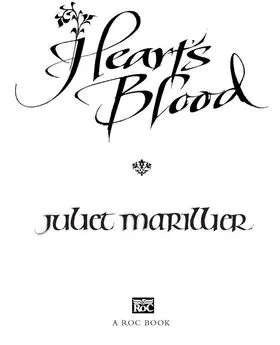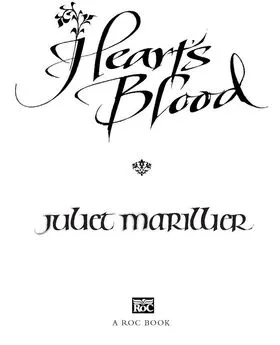Juliet Marillier - Wildwood Dancing
- Название:Wildwood Dancing
- Автор:
- Жанр:
- Издательство:неизвестно
- Год:неизвестен
- ISBN:нет данных
- Рейтинг:
- Избранное:Добавить в избранное
-
Отзывы:
-
Ваша оценка:
Juliet Marillier - Wildwood Dancing краткое содержание
Wildwood Dancing - читать онлайн бесплатно полную версию (весь текст целиком)
Интервал:
Закладка:
Aunt Bogdana wanted you to have his best embroidered waistcoat and his special writing materials; I have put them away for you. We have not seen Aunt since then, but Cezar has been at church. He told me his mother is prostrate with grief and wants no visitors.
I paused, quill between my fingers. It was cold in Father’s workroom. Outside, snow lay everywhere: piled up in drifts around Piscul Dracului, frosting the trees with white, blanketing the many odd angles and planes of our roof. Icicles made delicate fringes around the eaves, and the ponds were frozen solid. It was almost Full Moon again—two months since Father had gone away—and we still hadn’t received a single message from him.
“I don’t even know if he got my first letter, Gogu,” I said 88
out loud. “It’s hard to keep reassuring the others that he’s getting better when they know there hasn’t been any news.”
Gogu made no response. He’d not been himself since the terrible day of the hunting accident. Often his thoughts were a complete mystery to me.
“Come on, Gogu,” I said in exasperation, “say something.”
He turned his liquid eyes on me. Why not tell your father the truth?
“What am I supposed to tell him? That I can’t get any of the local men to come and work for us this winter? That the fences still aren’t fixed and we’ve started losing stock? I can’t worry Father with those things.”
Winters were always harsh in the mountains. All the same, Dorin could usually get men from the valley to come up and help us with our heavy work, for a reasonable payment. This year, when the men of the district were not busy keeping their cottages clear of snowdrifts, their hearths supplied with dry wood, and the river away from their doorsteps, they all seemed to be at Vârful cu Negur˘a, working for Cezar. Ivan had come up to give Petru a hand whenever he could, but the immediate work of the farm meant the bigger job of mending the fences had been put off too long. It must be completed before we suffered any more losses.
“I’m worried, Gogu,” I told my friend as I dipped the quill in the ink once more. “I thought I’d be able to manage better than this. I know Florica and Petru are working too hard, and it’s my job to get help for them, but I don’t seem to be able to do it. And I really don’t want to ask Cezar. He’ll just see it as an opportunity to remind me that girls shouldn’t trouble their pretty little heads with such weighty matters.”
89
Don’t bother yourself with him. Gogu had found an ink drop on the table and was dabbing it experimentally with a webbed foot.
“Stop it! You’re just making more mess for me to clean up, and I’m tired!” My tone was much too sharp for such a minor misdemeanor. I saw the frog flinch, and made myself take a deep breath. “I’m sorry,” I told him, reaching a finger to stroke the back of his neck. “I’m upset. It’s not just the farm, it’s Tati as well. She should be helping me, but she’s off in a dream half the time. I know she’s thinking about him —about Sorrow. It’s as if the moment she clapped eyes on him, she forgot every rule there is.”
On this topic, Gogu had nothing to contribute. I picked up the quill again.
We would love to know how you are keeping , Father, I wrote.
Could you give Cezar’s messenger a brief note? I am not sure if you received my earlier letter; I sent it some time ago. Please be assured that we are all in excellent health and are coping well, though the weather is extremely cold. We’ve had word that the consignment for Sibiu was delivered safely and unloaded at the warehouse. Your agent there will arrange for the items to be dispatched to their purchasers, and he will hold the payments in his strongbox until your return. I have not spoken to Cezar yet about Salem bin Afazi’s goods. As I said, we have hardly seen him since the poman˘a. Of this I was quite glad. I could not forget the image of our aunt bent over in her grief like an old woman, her hands lingering on each item of Uncle Nicolae’s clothing before she passed it to a ragged man, a skinny boy. I could still see Cezar’s stony face, which had seemed more furious than sorrowful.
As for Iulia, the shock of our uncle’s violent death had at 90
first left her withdrawn and tearful. Then, just as suddenly, she had become more willful and demanding than ever before, complaining about everything from the cold weather to the endless
˘
diet of mamalig
˘ a˘ to the fact that Tati wasn’t doing her share of the work. To my surprise I realized that on this last count, Iulia’s dissatisfaction was justified. I kept finding my elder sister gazing out of windows, or staring into space, or taking fifty times longer to perform a simple task than she should. Challenged over this, she gave vague answers: “I don’t know what you mean, Jena.”
“Oh, was I meant to be cutting up vegetables?” I tried to ask her about Sorrow. I tried to explain that things were difficult, that I needed her help. She did not seem to hear me. She was drifting in a little world of her own, her lips curved in a secret smile, her eyes seeing something that was invisible to me.
I signed and sealed Father’s letter, wondering whether it was fair to ask Petru to take it over to Vârful cu Negur˘a. I didn’t want to go myself. I would never be able to walk in there again without seeing Uncle Nicolae’s blood, without hearing Aunt Bogdana’s scream.
Someone’s coming. Gogu made a leap in the general direction of my pocket. I managed to catch him and scoop him in as the door to the workroom opened and Paula appeared, looking apolo-getic. “Cezar’s here,” she said, and a moment later he was marching into the room, where he sat himself down opposite me at the small square table on which my writing materials were laid out. He was neatly dressed, all in black, and around his neck he wore an ornament that had belonged to Uncle Nicolae: a gold chain with a medallion in the shape of a hunting horn.
“Oh,” I said. Then: “Cezar, I wasn’t expecting you. Paula, 91
will you fetch Tati, please?” Whether my cousin was here for business or for family matters, I knew I did not want to deal with him alone, not now that his father’s death had changed things so much. Besides, to do so would be considered unseemly under the rules of polite conduct that were so important to our aunt.
Paula fled. Cezar was looking at the sealed document on the table before me. I seized on a topic of conversation. “I was just writing to Father. I’m hoping you may have someone who can deliver it to Constan¸ta for me.”
“Of course, Jena.” He took it and slipped it inside his jacket.
“You realize that it may not be possible for a while. The roads are unreliable at the best of times. And it looks like a bad winter—”
“Yes, I know.”
There was an awkward silence. I willed Tati to hurry up.
“How are you, Cezar?” I made myself ask. “How is Aunt Bogdana coping?”
His jaw tightened. His eyes took on a distant expression.
“My mother is as you might expect. Women lack the resilience to deal with such losses and move forward.”
Such a statement could not be allowed to go unchallenged.
“I can’t agree with you,” I said, twirling the quill pen in my fingers. “I’ve always believed women to have great strength of endurance. In times of war, for instance, it is they who bear the loss of their men and the disruption to their lives. It is they who keep their communities together. But I do understand how sad and shocked Aunt Bogdana must be.”
92
Cezar stared at me. I had no idea what he was thinking.
“You, I should imagine, would be different from Mother in such circumstances,” he conceded.
If that’s meant to be a compliment, we’d prefer an insult. Gogu circled inside the pocket, his mood indignant.
“Have you had any word from Father since we last saw you?
Anything at all from Constan¸ta?” I tried for an unconcerned, businesslike tone, though his last comment had struck me as quite odd.
“I’m afraid not, Jena. You must not distress yourself.” His hand crept out and laid itself over mine on the table.
I snatched my fingers away; something about his gesture felt entirely wrong. “I’m not distressed, Cezar,” I snapped. “I realize not much gets through in winter.” I made myself take a deep breath.
Cezar gave a small, knowing smile. That irritated me even more than his ill-advised gesture of comfort. I reminded myself that he had lost his father only a month ago, that he must still be grieving. If his behavior seemed a little out of place, that was probably why.
“It’s kind of you to pay us a visit,” I said, trying to act as Aunt Bogdana might expect under the circumstances. “I’m hoping your mother may be able to receive visitors in return—”
A tap at the door—Paula again. “I can’t find Tati anywhere,” she said. “And there’s a man at the door, his clothes are all ragged, and he says he has no work, no food, and no money, and his wife and children are starving. Florica said to ask you if we can give him something.”
93
“Some food, of course,” I said, getting up and going to the shelf where our store of silver and copper coin for household expenses was kept in a locked box. There had been a steady stream of travelers to the door of Piscul Dracului since the start of winter, and it did not seem right to send them off without a coin or two in their pockets. The pinched features and tattered garb of these wayfarers worried me. For every man we saw, there would likely be a woman and a gaggle of children out in the woods, trying to survive on what they could get from one landowner’s door to the next. I wondered how many died between one grand house and another. The fields were thick with snow.
“You are overgenerous,” Cezar commented, eyeing the iron-bound box as I placed it on the table and turned the key.
“A package of food, a kind word—even that is more than many of these folk deserve. They are wanderers because they don’t know the meaning of hard work, because they have squandered their opportunities. You shouldn’t waste your money— What is it, Jena? What’s wrong?”
I was gaping into the box. Last time I had opened it, to make a small payment to Ivan, it had been three-quarters full, copper well balanced with silver. Now the contents barely covered the bottom, and there were only five silver pieces left.
Almost overnight, our winter funds had disappeared.
“Jena?”
I suppose I had gone pale. I sat down slowly, gripping the table for support, my mind desperately seeking explanations.
A mistake, some kind of mistake . . . Someone had moved the money. . . . Someone had put the household coins in the business 94
coffer in error. . . . No, I had checked the business funds myself only this morning.
“Jena, what is it?” Cezar leaned closer, frowning.
“Nothing,” I said, shutting the box with a snap. “Paula, go and tell Florica to give the man food, and to let him warm himself by the stove before he moves on.” My hands were shaking—
I clasped them together in my lap as she left. How could this have happened? The only people who knew where the key was kept were Father, my sisters, and me. We all knew this money must be conserved carefully to last all winter and perhaps beyond. How could I pay anyone to come and help Petru? How could I make a family offering at church? How could I go on slipping Ivan a little extra, so that he would see our wares safely transported to Sibiu and beyond? He had come to rely on that, with his family ever expanding and his farm too small to sustain all of them.
Читать дальшеИнтервал:
Закладка:






